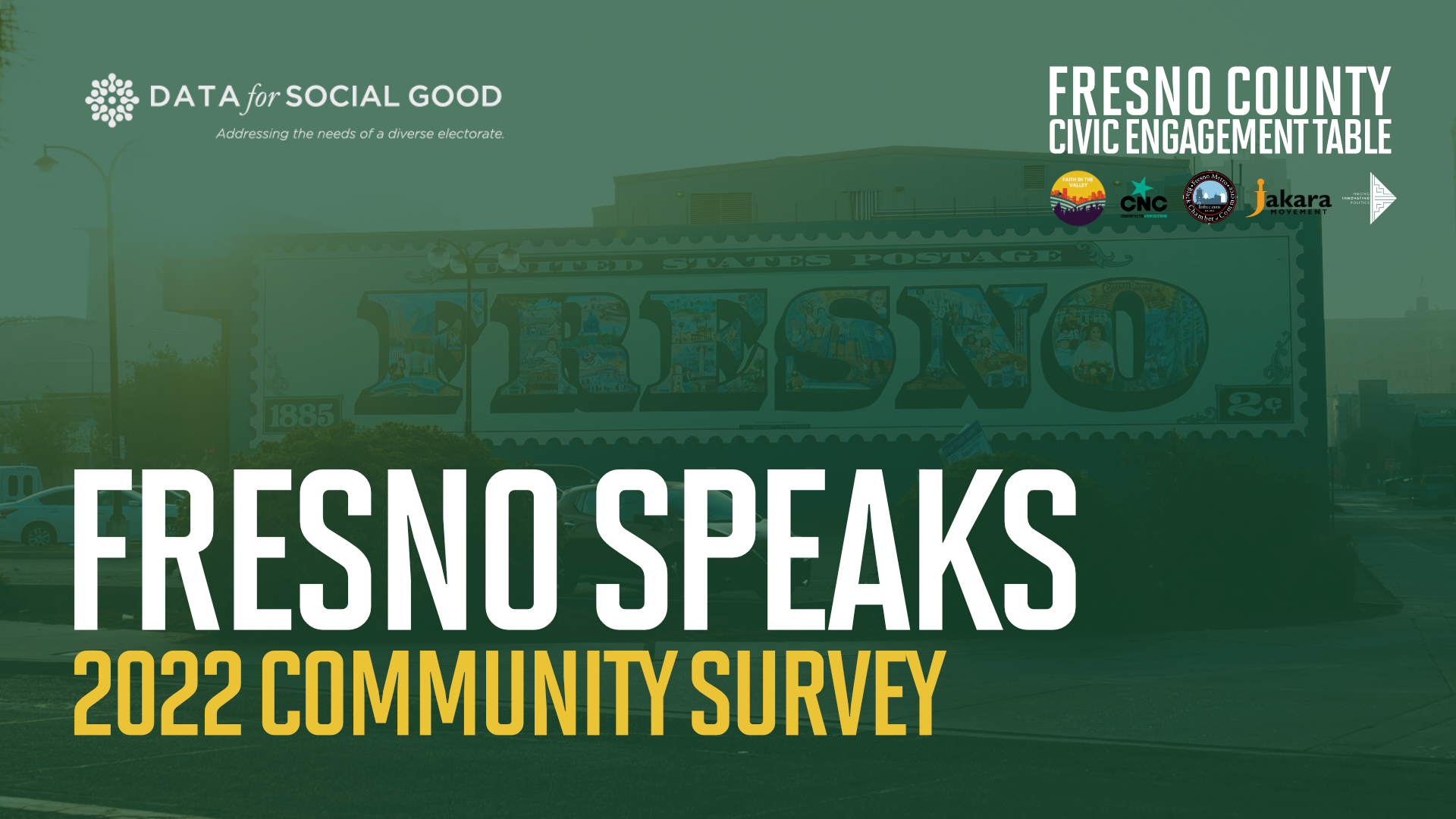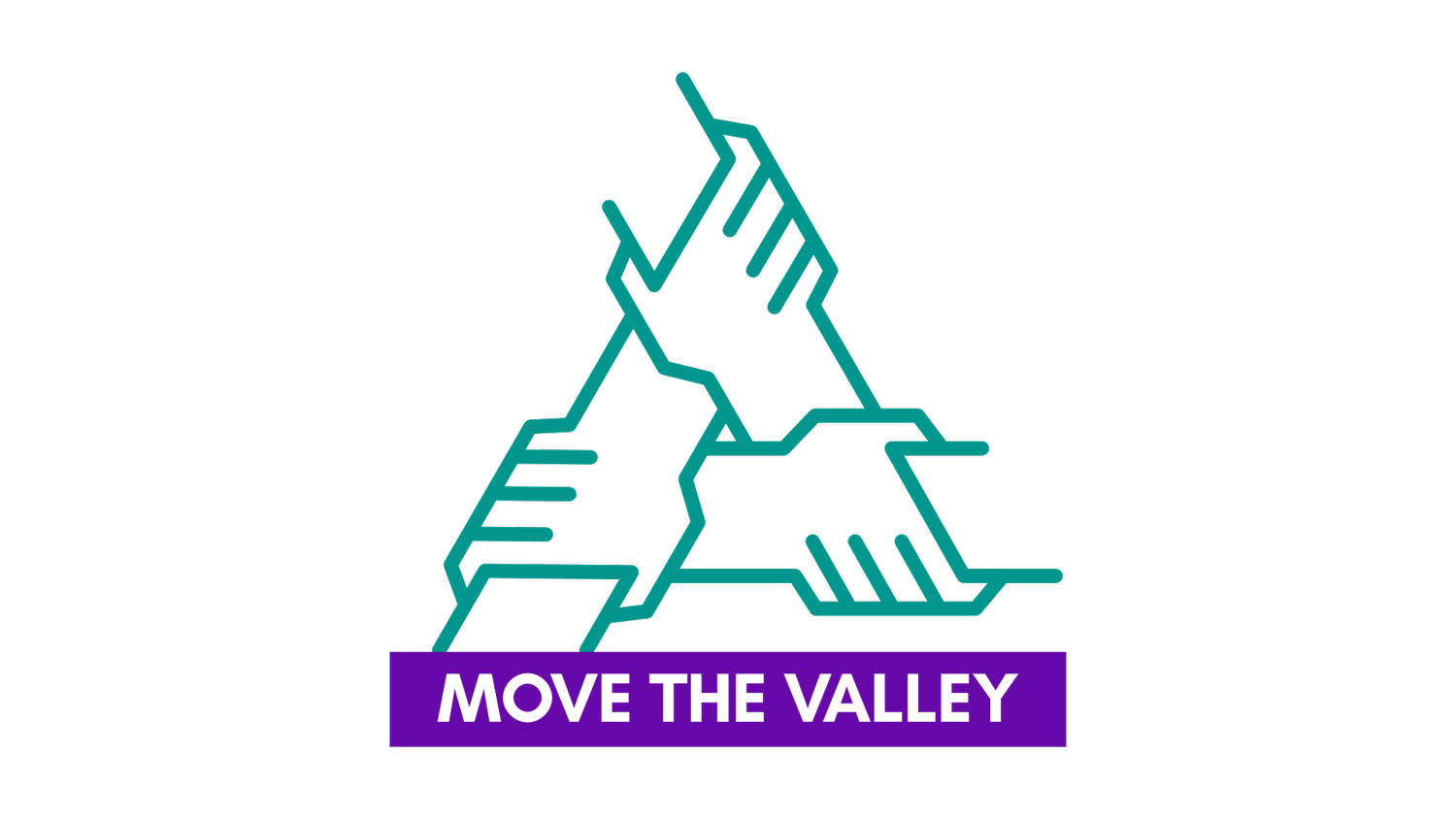San Joaquin Valley Speaks Survey
Beginning in 2018, what is now known as Move the Valley (formerly the Fresno Civic Engagement Table, or FCCET) set out to better understand—and therefore better represent—the issues that City of Fresno residents cared about most in order to guide its civic engagement efforts.
In 2020, Move the Valley launched its first annual representative survey of City of Fresno voters’ attitudes on issues impacting Fresno families. Partnering with the UC Merced Community and Labor Center, the survey was designed to be representative of Fresno and capture public opinion on major issues at both the citywide level and within each of its seven city council districts.
The second annual survey, Fresno Speaks 2021, was again conducted in partnership with the UC Merced Community and Labor Center. Between July 14 and August 23, 2021, 1,520 registered voters were asked about the impacts of the pandemic, the city budget, public safety, and their top priority issues.
The scale and accuracy of the Fresno Speaks survey made its findings particularly significant, with a +/- 3 percent margin of error citywide and +/- 7 percent at the district level. Remarkably, the 2021 survey also predicted the final certified recall election results within one percentage point.
In 2023, the survey expanded to include the entirety of the San Joaquin Valley.
2023 San Joaquin Valley Speaks Survey
Background
Data for Social Good (DSG) Data for Social Good (DSG) was commissioned by Mobilize. Organize. Vote. Empower (MOVE) the Valley, a coalition of civic engagement organizations that was formerly known as the Fresno County Civic Engagement Table (FCCET) to conduct a survey across the San Joaquin Valley. The survey was conducted from November 9 to December 3, 2023. A total of 2,616 respondents from Fresno, Merced, Sacramento, San Joaquin, Stanislaus, Madera, Kings, Kern, and Tulare counties completed the survey either by email or via phone. DSG oversampled Latino, Black, and Asian respondents to approximate the counties' registered voters and has a 2+/- margin of error.
Based on publicly available research, this is the largest and most exhaustive Central Valley study conducted in the past two decades.
Executive Summary
Overall, San Joaquin Valley residents cite affordable housing and to some extent local infrastructure as having most negatively impacted their households. From a field of choices and forced to choose one:
Affordable Housing (42.5%) with this issue being statistically significant for Latino, Black, Female, 18-35 year old, Democrat, and NPP respondents
Local Infrastructure (20.2%) with this issue being statistically significant for White respondents
Lack of opportunities for youth and young adults (13.5%) with this issue being statistically significant for Latino and Black respondents
Affordable Housing
Of those concerned with affordable housing, nearly 80% believe that rent and home prices are too high in their community.
Over half of respondents own a home (55.4%) while the rest have alternative living arrangements. This is in line with the California state average of homeowners (55.6%).
White, Male, and Republican respondents were statistically more likely to own a home
Homeowners claim the greatest benefit to owning a home is financial stability and the ability to accumulate wealth
Non-homeowners cite home affordability and current income as barriers to homeownership
Respondents 18-35 were statistically more likely to rent or live with their family
Local Infrastructure
Local infrastructure was cited as the 2nd issue (20.2%) that has most affected respondents and their families in the San Joaquin Valley. Of those who selected this as their top issue:
65.8% are concerned with the amount of potholes in their community
15.6% believe that the sidewalks in their neighborhood are inadequate
12.6% find the lack of functioning streetlights concerning
Opportunities for Youth
The lack of opportunities for youth and young adults in the San Joaquin Valley was the 3rd issue (13.5%) of concern among respondents. Of those who selected this as their top issue:
37.8% believe that their education system fails to prepare students to transition into the workforce
28.3% do not think there are enough entry-level jobs to support the youth
within their community
Reparations
The San Joaquin Valley is split on their attitudes towards their support of the reparations movement in California. 39.6% of respondents are likely to support the movement, while 38% are unlikely to support it, with 22.5% neither likely nor unlikely to support the reparations movement.
Support: with Black, Female, 18-45 year old, and Democrat respondents being statistically more likely to support reparations in California
Neither: with AAPI respondents being statistically more likely to have a neutral stance on reparations
Opposition: with White, Male, 46+ year old, and Republican respondents being statistically more likely to not support the movement
Of those who support the reparations movement:
Advancing educational opportunities for the Black community (47.9%) is thought to be the most beneficial form of reparations
Providing housing voucher programs (20.2%) and financial compensation (19.6%) for the Black community follow
Followed by reducing over-policing in Black communities (12.3%)
2022 Fresno Speaks Survey
Background
Data for Social Good (DSG) was commissioned by The Fresno County Civic Engagement Table (FCCET), a coalition of local organizations to conduct a survey within the City of Fresno. The research was conducted from June 25 to August 23, 2022. A total of 1,850 Fresno residents were contacted via phone by members of the coalition. DSG oversampled Latinos, Blacks and Asians to approximate the City's registered voters and has a 2+/- margin of error. This is the third iteration of Fresno Speaks conducted in 2020, 2021, and now 2022.
Key Findings
Overall, Fresno residents are focused on housing and public safety as issues negatively impacting their household. From a field of choices and forced to choose one:
Housing (20.5%) with this issue being statistically significant for Latinos and Blacks
Homelessness (18.4%)
Crime / Gun Violence (16.9%) with this issue being statistically significant for Whites
Addressing Public Safety
When asked about how to successfully reduce violence, respondents focused on prevention and rehabilitation with most favoring:
Mental health services were the top choice with (26.4%);
Followed by job opportunities for formerly incarcerated (21.3%) at a statistical rate for Latinos and Blacks than their White or Asian counterparts; and;
Targeted programs within schools (16.5%)
Support for Local Programs & Amenities
The Advance Peace Program enjoyed overwhelming support (89.1%) especially among Latinos.
Measure P respondents prioritized traditional park improvements and facilities with the following:
Improving Picnic Areas (49.5%), more so for female respondents
Expanding soccer facilities (19.1%), more so for Latino and White respondents
Refurbishing basketball courts (13.7%), more so for Black respondents
Fresno residents want to use Measure A funds to fortify people and neighborhoods. The top three responses were:
Mental health services
Improving streets sidewalks and streetlights (23.6%), especially true for Latinos, Asians, and respondents 18-35 and 56 to 65 years old
And more after-school and summer youth programs (21.6%), especially true for Latino, Black, female respondents, and respondents 26 - 45 years old
Improving Access for a Increasing Engaged Fresno
Contrary to the perception of residents in the Central Valley, an overwhelming number of Fresno residents believe voting is important:
85.5% believe that voting is extremely important or very important
Unfortunately, 30.9% of residents struggle in understanding how to engage or contact their city council representative and of those concerned about evictions or foreclosures 57.3% don't know about City or County resources or where to find them.
Overall, Fresno residents want to get involved in resolving problems. Residents want to get involved in:
Cost of living issues (including housing, homelessness, healthcare, and internet access)
Youth issues (including quality of public schools and youth involvement)
Community and social issues (including support for people with disabilities, racism, and voting rights)
Environmental issues (air pollution and climate change














